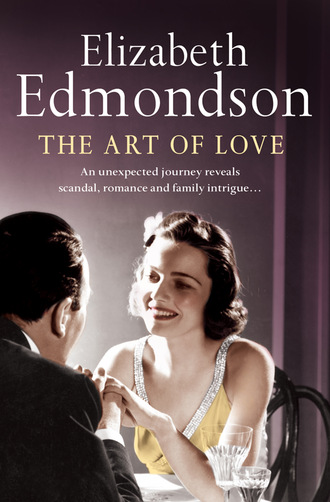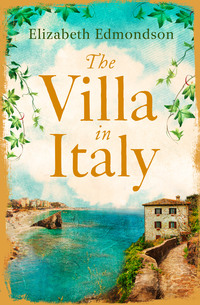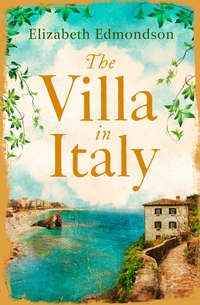
Полная версия
The Art of Love
‘I left it at home. In Highgate. With my mother,’ Polly said swiftly and untruthfully, shocked at how easily the lie sprang to her lips. She dug her spoon into the apple pie which had been set in front of her. It was covered in clotted cream sent up from Devon, where the Harrington family came from and had a holiday house, and she rolled the food around in her mouth, barely able to swallow it.
‘A walk in the park?’ Dr Harrington suggested when they had had coffee upstairs in the drawing room. The walk was part of the ritual, and today Polly, sleepy and disturbed, was more than willing to get out of the house and walk herself back into a good humour.
The park in question was Regent’s Park, looking rather forlorn in the fading light of a winter’s day. Polly linked arms with Roger, and Celia walked on her other side, talking across her to Roger about Alice. ‘I’m pleased to see her take her school work seriously. She needs to buckle down to her books and really apply herself if she’s going to get a place to study medicine.’
Roger nodded.
‘Does she want to be a doctor?’ Polly asked.
Celia had a particular laugh which had nothing to do with mirth. She laughed now. ‘Of course she wants to be a doctor. She’s a Harrington. She’s lucky, she’s got the brains for it, and of course the family will help her get a place, only she must get good results in her exams. Women can’t get in on rugger and good humour, they have to be twice as good as the men on the academic side.’
‘What would she do if she weren’t a Harrington?’
‘Don’t be tiresome, Polly,’ said Roger. ‘She is a Harrington, it’s irrelevant.’ And then, with a flash of irritation, ‘I suppose she’s been going on to you about how she wants to be an actress. It’s nonsense, childish fantasy, there’s no question of it. Wanting to go on the stage, I ask you!’
A chill came over Polly that was unconnected with the icy wind that had sprung up and was blowing the last leaves of autumn across the path. A squirrel ran down a tree, and sat upright, looking at them with beady eyes before springing away.
‘Does Alice have no say?’
Roger looked at her in surprise. They were much of a height, for he wasn’t a tall man, and Polly was tall for a woman. ‘A say? Of course she has a say. She has plenty of say, it’s impossible to shut her up.’
‘No, a say about being an actress.’
‘I’ve told you, it’s just a silly idea she has. She’ll grow out of it. She’s got too much sense and too good a brain to go in for anything so foolish.’ Roger put his arm round her waist and gave her a squeeze.
‘If we had a daughter, wouldn’t you let her do what she wanted?’ Polly said, looking at the ground as she walked.
‘Parents know what’s best for their children, and I’d hope that any daughter of ours would be too sensible not to want a decent profession, at least until she married, and medicine, if a woman chooses the right field, general practice or paediatrics, can be combined with marriage and even motherhood. Don’t worry about Alice, Polly. She’ll want to be a dancer or some such rubbish next week, and I dare say a balloon pilot the week after. You know how girls are at that age, all this acting business is just a passing fad.’
Polly remembered how she was at that age, absorbed in her painting and drawing, fascinated by colour and line and perspective, spending all her spare time in galleries or looking at pictures and sculptures in books, intoxicated by the beckoning world of the artist.
Polly had got engaged to Roger on the way home from a Sunday spent with his family. Warm and secure, she had wrapped herself in Roger’s embrace, welcoming the tweedy solidity of his arms, the lingering scent of pipe tobacco. Now she suddenly felt she was looking at him and his family as though through a shattered pane of glass, with the tranquillity and security distorted and broken into a thousand pieces.
FIVE
‘Happy families! You’ve too much sense to be taken in by a happy family,’ Oliver said to Polly that evening, as they sat side by side on a settle covered in faded red velvet in the Nag’s Head. Polly, who had drunk two glasses of burgundy at lunch, was drinking lemonade, while Oliver had a whisky and soda. It was quiet, on a cold Sunday night. A fire burned in the old-fashioned grate, and the pub cat, a large ginger tom, was curled up on the chair opposite.
Oliver had come round with uncannily good timing, to find Polly sitting on her bed in something like despair.
‘Come on, Polly, it’s not like you to be down. What’s amiss? No, don’t tell me. Put on your coat and hat, and we’ll go for a drink. Then we can share our tales of sorrow.’
Polly looked gloomily into her glass of lemonade. ‘It’s just that life’s a bit fraught at the moment,’ she said finally. ‘Why share our sorrows? What’s up with you?’
Oliver was an equable man, who took life lightly, often amused, sometimes sarcastic, inclined to be free with his tongue and opinions, but always in a slightly detached way.
I feel closer to him than I do to Roger, Polly said to herself. Roger’s a fiancé and a lover, but he isn’t a friend. I don’t think he ever will be a friend.
‘Bertram — well, Bertram and I are washed up, that’s all,’ said Oliver. He took a big swig of his drink. ‘I think I need another one of these.’ He got up and went over to the bar and sat down again. ‘Sorry, Polly. I don’t think you need to hear about other people’s problems.’
‘You aren’t other people,’ said Polly.
Polly had discovered that Oliver was a homosexual by the merest chance; that is, she had gone to his flat, at his request, and had found him in bed with a man. Both of them naked, Oliver’s friend severely embarrassed, snatching up the cover to conceal himself, Oliver stark naked and still aroused, laughing at her expression as she tried to back out of the door.
‘Oh, come in, Polly, and don’t be missish. Bertram, come out from under that sheet, for Christ’s sake. This is Polly, not the police come about the vice.’
He had lazily put on a silk dressing gown. ‘I quite forgot I asked you to bring those prints round, Polly.’
Bertram, his face scarlet, came out of the bedroom tucking his shirt into his trousers. ‘For Christ’s sake, Oliver.’
‘Polly, this is Bertram. An old, and as you can see, a very close friend. We were at school together. A long time ago, but affections can linger. Now, don’t get worked up, Bertram. One thing about Polly here is that she is utterly discreet and completely trustworthy. There are few people I would trust not to spread this delicious piece of scandal around London, and lucky for us, Polly is one of them.’
Polly sat down on Oliver’s elegant sofa with a thump. ‘I’m so sorry. What an awful thing to do. I didn’t realize…’
‘Is it so much worse than finding me in bed with a woman? Yes, I suppose it is.’
‘You do understand, don’t you?’ Bertram said, sitting down on the matching sofa opposite and gazing solemnly at Polly. ‘You do understand that if this ever got out — well, it mustn’t for both our sakes. Oliver simply can’t take any risks, not after—’
A warning look from Oliver silenced him for a moment. ‘Well, I won’t go into the reasons. And as for me, no one has any idea. That I — that I’m…You do see, don’t you?’
Polly did. Some queers weren’t bothered one way or the other, such as Sam, who was quite open about his inclinations. That worried her, because you read in the papers about people, even famous people, being had up for accosting other men.
‘It’s a private affair,’ said Oliver, watching her. ‘Not like picking up guardsmen or boys in the park, you know. Think of us as a couple, but a couple who have to keep their relationship secret.’
‘If my family ever knew…’ said Bertram. He took out a silk handkerchief and passed it across his brow. He was a good-looking man, with light brown wavy hair and deep, dark blue eyes. He smiled at her, his face relaxing for the first time, and she smiled back.
‘Don’t worry,’ she said. ‘I wouldn’t have had this happen for the world, but your secret’s perfectly safe with me. Truly it is.’
She rose, wanting to get away.
There had been a time, when she first met Oliver, when she might well have fallen in love with him. She had never felt such a rapport with a man; she felt utterly at ease in his company, even when she barely knew him.
And now Oliver had lost Bertram? ‘That’s dreadful, Oliver.’
His mouth trembled, and he bit his lip to control it. ‘It is, rather. When you love someone as much as I do Bertram, one can’t imagine life without him.’
‘But why? Has he found someone else?’
‘He’s getting married,’ Oliver said flatly. ‘He’s decided to put what he calls “all this” behind him, and he’s marrying a nice girl. A friend of his family. Suitable in every way. His family are thrilled. He wants me to be best man.’
‘He wants you — oh, Oliver, no! He can’t ask that of you.’
‘It seems he can. However, since he’s getting married next month, and I plan to be in France for the whole of January, he will have to look elsewhere for a best man.’
‘You sound bitter. I’m not surprised.’
‘No, I’m not bitter. In a way, I always knew it would end like this. Bertram has never liked the cloak and dagger side of such a friendship, the secrecy, the effort to keep it all hidden. Some of us thrive on it, he doesn’t. He yearns to be respectable, like everyone else. Sad to say, he has an essentially bourgeois nature.’
‘But if — if he’s the way he is, how can he marry? The poor girl, she doesn’t know about you and him?’
‘Good heavens, no. I don’t suppose she even knows that such relationships exist. No, she doesn’t know, and Bertram is definitely not going to tell her. He’s going to walk down the aisle with his radiant bride on his arm, and from then on, he’ll be a normal man. He wants children, of course. That’s a strong pull. That’s one thing we can’t give each other. Oh, hell, Polly, why is love so beastly? You’re so fortunate, with your staid Roger and the whole world beaming approval, you don’t know how lucky you are.’
‘I thought so, but I’m not so sure.’
‘Lovers’ tiff?’
Polly pulled a face. ‘Can you imagine having a lovers’ tiff with Roger? Arguing with him is like disagreeing with a brick. No, it’s just that I saw a side of him today that I didn’t know about, and I didn’t care for it much. He’s going to America, sailing at the weekend. To spend time with American doctors in Boston.’
‘Is he? How long for? I thought you were all lined up for a wedding in the new year.’
‘Not any more. It has to be postponed until he gets back, sometime in February.’
‘And you aren’t upset?’
‘No, not at all. I don’t mind being engaged, there’s a comfort in it, and I’m happy enough when I’m with Roger. But marriage is a bit of a step.’ Polly twisted her glass round in her hands. ‘He maintains I can’t go on working once we’re married. In fact, I think he expects me to give up my painting altogether. Which is all a bit of a wrench, I like what I do at the workshop.’
‘I saw that coming, even if you didn’t,’ said Oliver. ‘You do sound dreary, ducks. All this and the art not going too well.’
‘Don’t say that!’ said Polly, roused out of her glumness by his unexpected attack.
‘My dear Polly, your paintings are getting smaller and dingier by the week. Whoever is going to buy them? They’re technically very good, but if you go on the way you are, you’ll end up painting miniatures.’
‘Canvases of a decent size cost money.’
‘Come on, that’s not the reason, and you know it. Life’s boxing you in, that’s what’s happening to you. Time to burst out, Polly my dear.’
‘Do you think one can do that? Change one’s life? Leave the old one behind like a snake shedding its skin? I don’t. I think however hard you tried, you’d still be the same old snake, hissing and coiling in the same old way. Even if you did have a shiny new shape, all green and gold and glistening…’ The snake was there, in her mind’s eye, or perhaps green and gold was more appropriate for a dragon. The creature morphed instantly into a beast with snorting, fiery breath and huge wings, and Polly laughed.
‘That’s better,’ Oliver said. ‘I’ve an idea. Come and spend a few weeks at my father’s house in Cap Rodoard, in the south of France, where the light will dazzle your eyes, even in the depths of winter. It’s a strange place, my father’s house, but there’s quite a community of artists in the village, plenty of kindred spirits for you. I think the dim dreariness of a bad London winter is seeping into your soul. Over there you can throw open the shutters in the morning, and there’s the sun pouring in to lighten your life. Palm trees outside the window, colour everywhere to lighten your darkness.’
His father’s house. Oliver never spoke about his family, he might have been an orphan or one of ten children for all Polly knew. ‘Does your father spend much time in France?’
‘He lives there.’
‘Why? Doesn’t he like England? Or is he French?’
Oliver looked amused. ‘Good Lord, no. As English as they come, bad barons going back through the centuries.’
‘So why France?’
Oliver went quiet, then lifted his glass and finished his whisky. ‘He prefers it,’ he said.
‘Do you have other family over there? Is your mother…?’
‘My sister might be out there for the winter, with or without her husband, but she needn’t bother you.’
Polly sighed. ‘It’s kind of you to ask, Oliver, and I should love to go to France, but it’s impossible.’
Polly had suggested to Roger that they go to France for their honeymoon, Paris, she said, thinking of that city so redolent of artists, of galleries crammed with wonderful paintings, of la vie bohème. Then they could go down to the south for a few days, perhaps…
Roger had shaken his head. ‘I don’t care for France, and you wouldn’t like the south of France, it’s a frivolous place, if you mean the Riviera. No, mountains are better. Lots of clean, good air, and I might get some climbing in. Switzerland might be best, or Austria.’
‘Why impossible?’ said Oliver.
‘Oh, too expensive, and no, before you offer, I won’t let you fund me, and no, you don’t want to buy one of my pictures. Come on, Oliver, you and I have always been honest with one another.’
‘Have we?’ said Oliver. ‘I suppose so.’
One says these things, Polly told herself. But it isn’t true. Oliver keeps most of his life to himself, I only ever get a glimpse here and there, when he comes out of his own world to come visiting in mine. And what about me? I haven’t told him about Polyhymnia, and I don’t know why not.
‘Besides, Roger wouldn’t care for my going. I’ve got to consider his feelings.’
‘Surely he isn’t jealous of me?’
‘No, but…’ Polly didn’t want to tell Oliver that Roger disapproved of her friendship with him. He probably knew it already. Was that something else that would be cut out of her life, once she was Mrs Harrington? No, it wasn’t. Her days would be her own, Roger couldn’t keep tabs on her for every hour of the day, she wasn’t entering a harem, for heaven’s sake.
‘Live a little, before you get shackled for the rest of your life, I can’t see a woman like you ever leaving her husband. Shake the savings out of the piggy bank, and splurge it all on a ticket. Away with the gloom of an English winter, a month in the sun, what could be better for you? Bring some colour back into your cheeks.’
His words echoed those of Dr Parker, was she really so pallid? ‘I don’t believe it’s sunny anywhere in January. I bet it rains there too.’
‘Oh, it does, and snow has even been known to fall, every twenty years or so, but mostly it’s far warmer, and always brighter. It’s the light, Polly, that’s why artists love the south of France. Now, finish your lemonade, and I’ll take you to Bertorelli’s for supper.’
‘I had a huge lunch.’
‘Yes, but emotion is very draining, you need to keep your strength up.’
He said goodbye to the luscious Irene, the bosomy barmaid who presided over the bar at the Nag’s Head, and they went outside.
‘Touch of frost, tonight,’ said Oliver. He lifted his hand as a cab came in sight, and opened the door for Polly.
Sitting in the dark, slightly smelly interior, Polly asked, ‘How much does it cost to get to France? Oh, I suppose that’s a silly question. You’d travel first class.’
‘Third class would be about ten pounds,’ Oliver said. ‘Having second thoughts?’
‘I haven’t got ten pounds,’ Polly said regretfully. ‘Having ten shillings to spare at the end of the week would be a minor miracle.’
‘Get some more of those book jackets you do.’
‘And there’s my work in Lion Yard to consider. I don’t want Mr Padgett finding someone else to take my place.’
‘It seems that you’ll have to give it up in any case, so why not a month sooner?’
‘No, Oliver. It’s tempting, but I can’t come, and that’s that.’
SIX
Max Lytton arrived at the Feathers Inn before Inspector Pritchard. It was an old-fashioned pub, not so very different from when it was built in the seventeenth century, with its polished wooden boards and a warren of narrow passages and staircases that led into unexpected rooms or out into one of its several yards. It had been a haunt of highwaymen in its heyday, and it was easy to imagine booted and cloaked men lurking in dark corners or in the cobbled courtyard, where the stables had been turned into a bar.
Max went into the downstairs dining room, a discreet place, with the tables set against the walls and screened by high-backed wooden seats. A perfect place for private conversation, which was what Max wanted. A log fire burned in the wide stone fireplace, and there was sawdust on the floor. He found an empty table and sat down with a tankard of the pub’s famous ale.
‘I’m waiting for a friend,’ he said to the waiter who was hovering to take his order, and as he spoke, he saw Pritchard standing at the door. Pritchard hesitated, looking round and then, as Max rose, lifted a hand in greeting and came over to join him.
A pint of bitter was brought for Inspector Pritchard, and the waiter came back to take their order. He could recommend a cut off the joint of Welsh lamb, excellent today or, of course, there was the inn’s renowned steak and kidney pudding.
‘They make it in the traditional way, with oysters,’ Max told Pritchard.
‘I’m not a great man for shellfish,’ Pritchard said in his lilting Welsh voice. ‘I’ll have the lamb, since it comes from my country, and our sheep are the best in the kingdom.’
The waiter went away, and the two men regarded one another in silence. They had met two years before, when Inspector Pritchard was a detective sergeant, hoping for promotion. He had been working on a murder case, and Max, obtaining information that the police had no access to, had passed it on to the eager policeman. The case had been solved, a very unpleasant criminal brought to justice, and Pritchard had got his promotion.
‘I take it this is a professional meeting,’ said Max.
Pritchard’s soft brown eyes were guileless, but Max knew better than to take the look of sleepy indifference at face value. Pritchard was a wily man, who possessed a strong moral sense coupled with a healthy cynicism as to the essential evil dwelling within his fellow beings.
‘Professional, yes, but a matter best not tackled through the usual channels, do you see?’
‘Unofficial business? That doesn’t sound like your outfit.’
‘Not precisely unofficial, just best if the details are kept between the two of us. You have your masters and I have mine. And yours are happy for me to talk to you about this. They, too, want to keep it unofficial for the time being.’
To his friends and relatives and to the closed world of London society, Max Lytton was no more than a man about town. An attractive man, surprisingly still a bachelor, despite the best efforts of debs and their mamas. He came from an old family, had considerable private means — a fortune inherited from a great aunt had come as a surprise to a younger son and a source of discontent to his father and older brothers. Because of this, he could live the life he wanted; a life to which his father took endless exception. ‘Didn’t fight for your country in the war, now you live an idle life, of no value to yourself nor anybody else. We weren’t put upon this earth to be comfortable, but to leave it a better place, I don’t see you doing that.’
Max knew there was no point in remonstrating or arguing with his father, who knew perfectly well that it was lameness from a childhood dose of polio that had prevented him being butchered in the trenches. The fact that he had spent a hardworking and successful war in Military Intelligence meant nothing to his father, a retired general. ‘Desk job, waste of time, the place for cowards and men too old or effeminate to fight.’
Nor did his father have any idea that he had been one of the few men from his department kept on after the war ended, when the intelligence services were largely wound up, with the remnants tucked away in a forgotten corner of Whitehall, starved of funds. Although recently, things had begun to change, the situation in Russia was ringing alarm bells, and to the knowledgeable men who had experience of Germany, so were the repercussions of the Treaty of Versailles.
‘Excuse me, sir.’ The waiter put plates down in front of them, and then returned with a steaming pie which he set in front of Max. Another waiter arrived with a trolley, to cut thick slices of the succulent lamb for Pritchard. Dishes of potatoes, carrots and cabbage were placed on the table, and the waiters withdrew.
Pritchard spooned redcurrant jelly on to his plate beside his lamb. Max plunged a spoon into the golden crust of his pie and transferred a generous portion to his plate.
‘If it’s a police matter, I don’t see what it has to do with us,’ Max said.
‘Then you haven’t heard that I was transferred last year,’ said Pritchard. ‘To Special Branch.’
That surprised Max. The soft-spoken Welshman had a keen mind and that extra grain of intuition that singled out the exceptional policeman from the ordinary. But Special Branch? Perhaps it was a sign of the times, an indication of how alarmed the powers that be were about the rising anger and intensity of those who felt life hadn’t offered them a fair deal. Which, in many cases it hadn’t. Extremism was on the rise, certainly in continental Europe, possibly now even in England.
In which case, Special Branch would need capable officers like Pritchard. There was, after all, more to maintaining the peace of the realm than catching criminals.
Special Branch and the intelligence services worked in an uneasy alliance, with some bitter spats about territorial demarcations. If Pritchard’s and Max’s superiors were working together on this, it would mean that they were after someone who had dealings that went beyond the merely local and criminal.
‘Out with it,’ he said. ‘What particular game is afoot?’
‘I don’t see you as Watson, nor myself as Sherlock Holmes,’ said Pritchard, spearing a roast potato and chewing it carefully. He wiped his mouth with his napkin and took a draught of beer. ‘I believe you know Sir Walter Malreward?’
‘Ah,’ said Max. ‘Malreward. Yes.’
‘By reputation, in the way of business, or personally?’
‘He is a man much in the public eye, and I have a slight personal acquaintance with him. As to his business affairs, no, I have nothing to do with them.’
Pritchard was playing with him. Pritchard must know perfectly well who Sir Walter’s constant companion was, to use the coy words of the lower kind of newspaper. Mrs Harkness. Cynthia Harkness, recent divorcée, and Max’s sister.
‘Surely he isn’t up to any mischief? He runs what passes for a reputable publishing empire, gives money to the poor, is active in middle-of-the-road politics, keeps his nose perfectly clean.’
‘Do you like him?’









